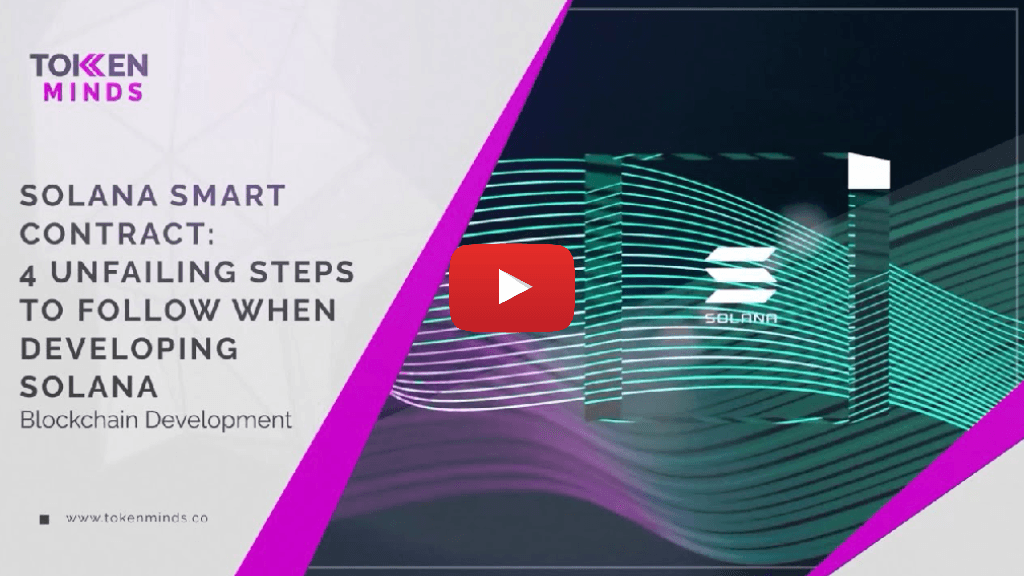Solana Smart Contract: 4 Unfailing Steps to Follow When Developing Solana – Blockchain Development

Video Transcript:
Rob: Hello everybody, and welcome to the Crypto Business Show. I am your host, Rob, director at TokenMinds, a full-service crypto and NFT company, helping businesses all over the world with their blockchain development, NFT marketing, and token sales strategy. I have in the podcast here with me Josh our lead development manager. Hi Josh.
Josh: Hi Rob, thanks for having me again here.
Rob: Thank you for being here. Today we’re going to discuss Solana’s smart contract for nft, and steps to follow when developing Solana digital contracts, starting with what is a smart contract creation process what can you tell us about the Josh?
Josh: Okay, so the Solana smart contract process is a little bit different from the usual EVM chains like Ethereum and polygon, however, the process involved is somehow similar. The first thing the developer needs to do in developing a smart contract in Solana is creating an appropriate Solana development environment, where on the EVM chain they will just need to set up an IDE-like remix. The second is to set up a local cluster so the local clusters are maintained by Solana like the devnet for testing and development purposes. Third, they need to craft the program or develop the program, and lastly as soon as that smart contract is done, you need to audit and implement the particular Solana smart contract.
Rob: All right and what are the benefits of developing smart contracts on Solana?
Josh: Solana is one of the most popular blockchains these days, it has five benefits in general. The first one is a high-speed blockchain. Solana blockchain can handle 50k transactions per second far more faster than any evm chains these days. Second is the low-cost transaction fees the transaction fees, or gas fees, on the Solana blockchain is so low that you can’t even recognize them. It’s a gas boost for a transaction in the blockchain compared to the evm counterpart like Ethereum. The third one is it has no network congestion, so there’s no gas wars in Solana unlike in Ethereum, there’s a lot of gas words going on, especially on times that there are multiple projects being deployed. So the Solana’s lack of mempool or a section where it dispense transaction wait before being approved,, is the one that eliminates the issue of network congestion, it uses a proof-of-history mechanism this helps speed up the process of transaction compared to the ebm counterparts. Fourth it’s a very environment friendly blockchain unlike those proof of work blockchain, wherein there are mining involved for verification of transaction, Solana as mentioned is using a combination of proof-of-history, and proof-of-stake in terms of consensus mechanism, and lastly it has enhanced openness and safety since Solana uses a Byzantine called tolerance technology it boosts the platform’s openness and security.
Rob: All right and how to choose a Solana blockchain development company?
Josh: So, how to choose Solana development company. I can share with you four steps on how to do this. The first one is you need to check of course the experience of the blockchain development company. So the developer should possess vast knowledge in various areas like Solana nft creation, decentralized finance, game development and building decentralized autonomous organization. Second, they should have deep knowledge about cyber security. Building on blockchain is very particular in terms of cyber security, and if you need to choose a blockchain development company, make sure they have an idea or have experience building secured smart contracts.
Third, this team needs to have a good knowledge of the programming language used in developing Solana. So in a nutshell, the Solana programming language is rust, so make sure the team has a rust developer on board, and lastly, they should have knowledge of the latest Solana frameworks. There are a bunch of frameworks these days like metaplex, wherein a candy machine is there, so you need to make sure that the Solana blockchain development company that you are hiring has the latest knowledge in building Solana smart contracts, in these modern frameworks. In general, in a nutshell, Solana is a cost-effective, congestion-free, and fast network, so developing in Solana will need an experienced team using the right tools and frameworks. So following the said steps will help you to build your Solana project with the right team and the right tools.
Rob: Okay, thank you so much, Josh, for sharing, and see you all next time. Goodbye.
Josh: Thank you
